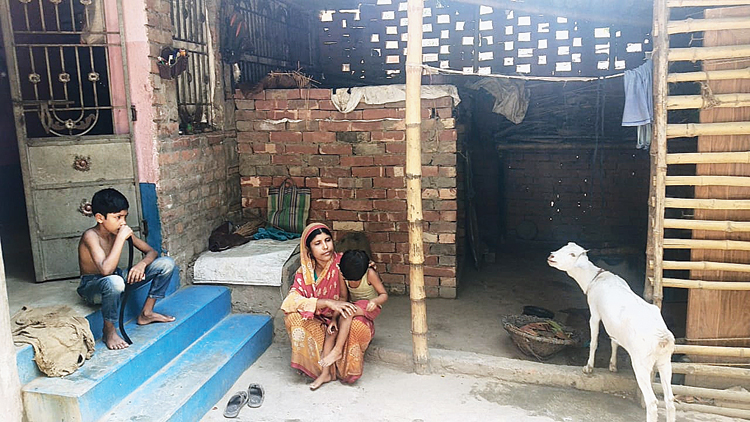Tanjera Biwi, 35, was sitting in the courtyard of her one-storey concrete home at Basudevpur village in Murshidabad on Friday morning as she was busy scribbling calculations on a piece of paper.
She had her Friday prayers to offer within a couple of hours, but she was more worried about the future.
“I have four children. What am I supposed to do? My husband lost his job as a mason in Kerala after the lockdown was announced and has been stranded there with no money to send us,” Tanjera said.
“He is running out of money to feed himself. Over here, I am running out of food. We are terrified and just don’t know what will happen to us,” added a distraught Tanjera, clutching her youngest daughter, three-year-old Anisha, who had darted into her lap upon seeing a neighbour pass their home.
Although the awareness of public health implications of Covid-19 doesn’t seem to have trickled down to all corners of rural India, the economic fallout is being felt, leaving millions — excluded from the food security and remote access to vital services — clueless about what the future would look like.
Families of lakhs of migrant wage earners in Bengal, like Tanjera’s, have been robbed of remittance income and thrown into social and emotional turmoil with their breadwinners being stranded in other states amid the lockdown. The fear of Coronavirus is so palpable that people have lost their sleep.
“When will my husband return safely, if at all? Will we have food to eat, even if we survive the lockdown and the pandemic?” Tanjera, who has been surviving solely on ration rice given out by the local administration, rolled out a volley of questions.
“Will my children go on to complete school?” Tanjera asked again, reiterating the hapless state of mind she and others in rural India were being forced to contend with on a moment-to-moment basis.
The story of Tanjera — even one-and-a-half months ago — was different as her family was considered affluent by her neighbours.
“We built a concrete home off my husband’s earnings three years ago and even sent one of our sons to a private English medium school,” she said.
“But we didn’t have savings and we have nothing to fall back upon,” she added.
Tanjera’s plight is playing out at the homes of lakhs of rural migrant labourers in the districts of Murshidabad, Birbhum, Burdwan, and Nadia. The migrant wage earners of at least 24 lakh are spread across states like Kerala, Karnataka, Maharashtra, Delhi, and Kashmir. Their income is in multiples of what they would earn from agriculture in their home districts in Bengal.
Tanjera’s husband, Mamsed, had moved to Kerala six years ago and had a salary which had allowed him to send home almost Rs 12,000 per month. “Now, he wants me to send him money. How can I?” asked the woman.
Family members of migrant workers at several villages in Murshidabad and Birbhum said they didn’t know how life would be if the main breadwinner — usually a son, nephew, husband or father — stop sending home the monthly remittance.
“I am alive right now because of the government ration, and I thank the chief minister for it,” said Areful Biwi, whose son Alam is stranded at his workplace in Kerala. At home in Murshidabad, Areful oversees a family of ten with whatever her son sent home.
“But this month, all of that changed. Now, I am looking at what, if anything, I can send him so that he does not have to go hungry,” Areful added, reflecting the dire condition of out-of-state youths stranded at the physical and psychological borders of the lockdown.
Although the Pinarayi Vijayan government of Kerala is helping migrant workers with food and shelter, the insecurity in the minds of stranded workers — as most of them have run out of cash — is transmitted to their family members back home.
Government officials in Bengal said the chief minister had already declared project Prachesta in an effort to give a financial dole of Rs 1,000 per month to families whose members had lost work during the lockdown.
Residents of Murshidabad, however, are yet to hear of it. Asked about the initiative, Tanjera sounded thankful, but also doubtful on how she and her family would survive on that amount.
“I haven’t heard about it yet. I pray that things take a turn for the better,” she said.
Adhir plea to PM
Behrampore Congress MP Adhir Ranjan Chowdhury on Friday wrote to Prime Minister Narendra Modi, urging him to arrange for safe return of lakhs of migrant workers stranded in various parts of India to their home states.
Chowdhury sought to draw Modi’s attention to the migrant workers and their families stranded with inadequate food, shelter, clothing and healthcare, besides being subjected to directionless-ness and uncertainty.











